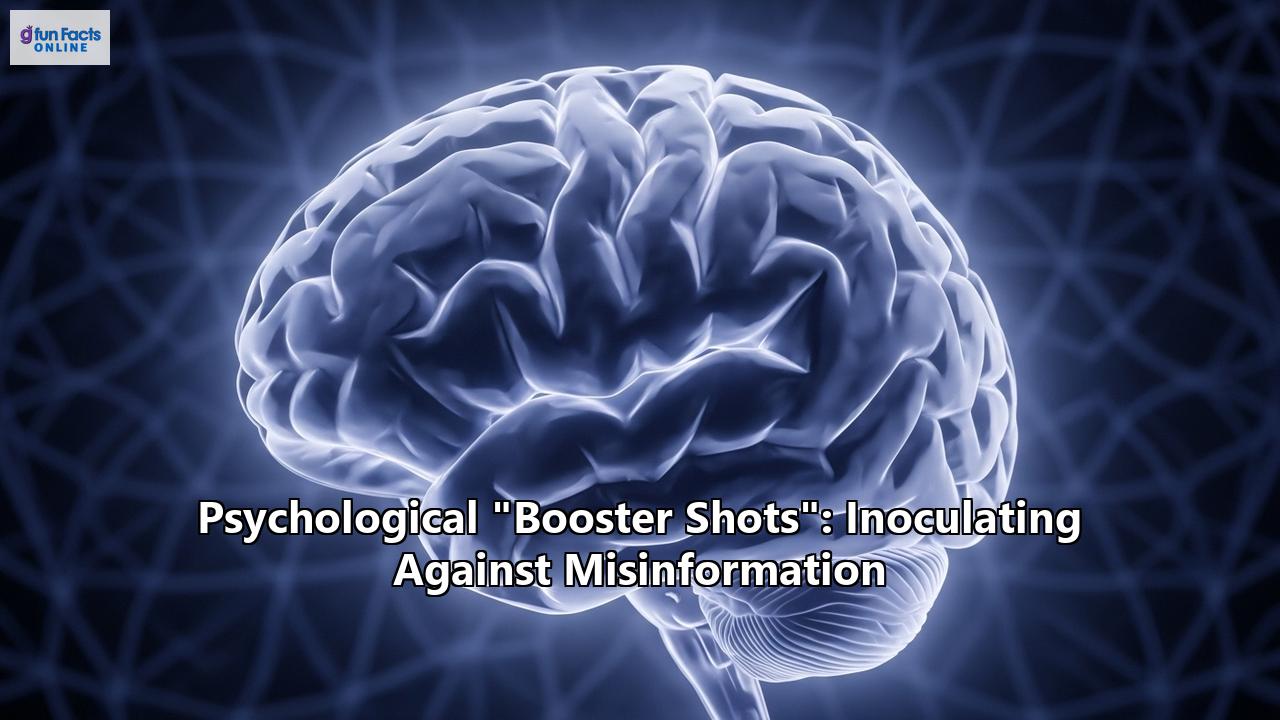In an age where information and misinformation collide with breathtaking speed, the concept of building a mental defense system against falsehoods has never been more critical. Just as a medical vaccine prepares the body to fight off disease, a "psychological vaccine" can train the mind to recognize and resist the persuasive tactics of misinformation. This proactive approach, known as psychological inoculation or "prebunking," is at the forefront of the battle for truth, offering a promising way to empower individuals against the tide of fake news, propaganda, and disinformation.
The Inoculation Theory: A Vaccine for the Mind
The core idea behind psychological inoculation dates back to the 1960s, when social psychologist William McGuire proposed that people could be made resistant to persuasion by exposing them to a weakened version of a misleading argument. This "mental antibody" production is a two-step process:
- The Forewarning: Individuals are first warned about a potential threat to their beliefs, motivating them to build a defense.
- The Refutational Preemption: They are then presented with a "micro-dose" of the misinformation along with counterarguments that expose its flaws.
By preemptively revealing the tactics used in misinformation, this process helps people build cognitive resistance to future manipulation attempts. The goal isn't just to debunk a single false claim, but to equip individuals with the skills to identify the manipulative techniques themselves, leading to a broader and more lasting immunity.
Prebunking vs. Debunking: A Proactive Stance
Traditionally, the fight against misinformation has been largely reactive, a process known as "debunking" or fact-checking. While essential, debunking has its limitations. It's often a race against time, trying to correct falsehoods that have already spread virally and taken root in people's minds. Furthermore, for those who already believe the misinformation, fact-checking can sometimes feel like a personal attack, potentially entrenching their beliefs further.
Prebunking, on the other hand, is a preventative strategy. It acts as a protective layer, empowering individuals to discern between true and false information before they even encounter malicious content. This proactive approach can be more sustainable and scalable, as it focuses on teaching transferable critical thinking skills rather than addressing an endless stream of individual falsehoods.
The Arsenal of Inoculation: Techniques and Strategies
Researchers and practitioners have developed a variety of methods to deliver these psychological inoculations, often categorized as:
- Fact-Based Inoculation: This involves correcting a specific false claim or narrative before it gains traction.
- Logic-Based Inoculation: This more common approach explains the manipulative tactics used in misinformation, such as:
Emotional Language: Using charged words to evoke strong feelings and bypass critical thinking.
Scapegoating: Blaming an individual or group for a problem.
False Dichotomies: Presenting only two extreme options when other possibilities exist.
Impersonation: Using fake accounts to appear as a credible source.
Conspiracy Theories: Weaving together unrelated events to suggest a secret plot.
- Source-Based Inoculation: This strategy focuses on highlighting unreliable sources of information.
A study on climate change misinformation, for instance, found that exposing individuals to inoculation messages from an expert source led to a greater perceived threat from misinformation and a reduced belief in false claims compared to messages from a common user.
Real-World Applications: From Games to Social Media
The principles of psychological inoculation are no longer confined to the laboratory. They are being actively implemented in the real world with promising results:
- Gamified Interventions: Online games like "Bad News" and "Go Viral!" put players in the role of a fake news creator, teaching them to master various misinformation techniques in a controlled environment. Studies have shown that playing these games can significantly improve people's ability to spot manipulative content.
- Video-Based Inoculation: Short, engaging videos that explain common misinformation tactics have proven effective. Researchers from the University of Cambridge and Google's Jigsaw unit created 90-second animated clips that were deployed as ads on YouTube. The results showed that even a single viewing increased viewers' awareness of misinformation techniques.
- Social Media Campaigns: Platforms like YouTube and Facebook have started incorporating prebunking strategies. In a large-scale experiment, millions of YouTube users in the US were exposed to an inoculation video, which led to a significant improvement in their ability to identify manipulation techniques.
The Importance of "Booster Shots" for Lasting Immunity
While inoculation is effective, its effects can diminish over time. Research has shown that the initial resistance can fade within a couple of weeks to a month. This is where the concept of "psychological booster shots" comes in.
A study published in Nature Communications* found that providing follow-up reminders or reinforcement messages can significantly enhance long-term resistance to misinformation. These "booster shots" work by strengthening the memory of the original inoculation, helping individuals retain the critical skills needed to identify and resist misleading information for a much longer period.
The study highlighted that the longevity of misinformation resistance is primarily driven by how well participants remember the initial intervention. This underscores the need for repeated exposure to inoculative messages to build and maintain a strong defense against the persistent threat of misinformation.
The Path Forward: A Multi-Layered Defense
Psychological inoculation is not a silver bullet, but it is a powerful and essential tool in the fight for a more informed public. Its effectiveness can be further enhanced when combined with other strategies. For example, some research suggests that pairing inoculation videos with "accuracy prompts"—simple reminders to consider the accuracy of information—can improve people's ability to distinguish between true and false headlines.
Ultimately, fostering a resilient information landscape requires a multi-pronged approach that integrates psychological inoculation into educational programs, media literacy initiatives, and public policy strategies. By empowering individuals with the cognitive tools to discern fact from fiction, we can collectively build a stronger, more discerning society, one "booster shot" at a time.
Reference:
- https://www.tandfonline.com/doi/full/10.1080/08934215.2025.2465306?src=exp-la
- https://philarchive.org/archive/BPFAME
- https://www.cam.ac.uk/stories/inoculateexperiment
- https://royalsocietypublishing.org/doi/10.1098/rsos.211719
- https://www.acice-asean.org/files/information%20centre%20reports/jul_24_info.pdf
- https://www.apa.org/topics/journalism-facts/misinformation-interventions
- https://www.cyberpeace.org/resources/blogs/prebunking-vs-debunking-interventions-comparative-analysis
- https://www.eurekalert.org/news-releases/1076149
- https://firstdraftnews.org/articles/a-guide-to-prebunking-a-promising-way-to-inoculate-against-misinformation/
- https://news.cornell.edu/stories/2024/11/could-inoculation-limit-misinformation
- https://files.osf.io/v1/resources/mr92k_v2/providers/osfstorage/67cd6f94cb5d3ccee2c9ba77?format=pdf&action=download&direct&version=1
- https://misinforeview.hks.harvard.edu/article/global-vaccination-badnews/
- https://www.ox.ac.uk/news/2025-03-11-new-research-reveals-psychological-booster-shots-can-strengthen-resistance
- https://www.iflscience.com/psychological-booster-shots-could-inoculate-against-misinformation-78386
- https://bioengineer.org/psychological-boosters-enhance-lasting-resistance-to-misinformation/

